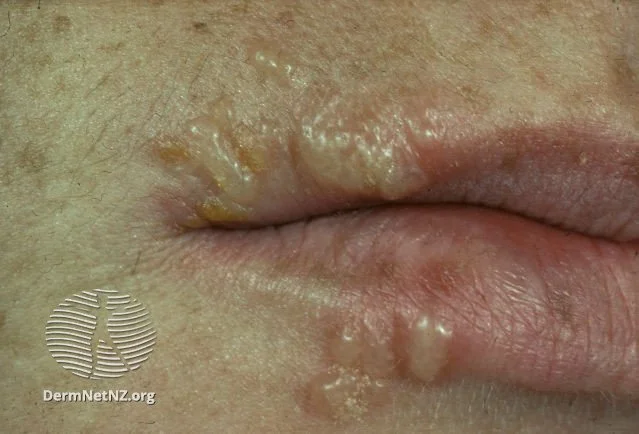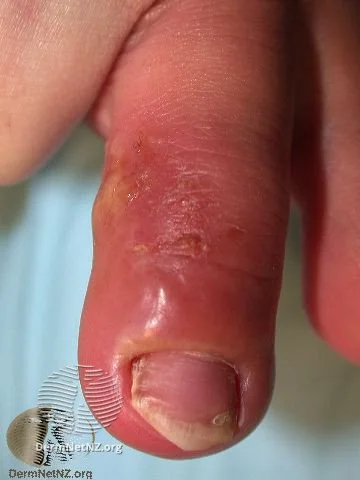
Herpes Simplex (HSV)
An example of herpes simplex labialis (cold sores), which looks like fluid-filled blisters on a red base around the mouth or nose.
Credit: DermNet NZ
What is herpes simplex (HSV)?
Herpes simplex is a viral infection often marked by outbreaks of oral or genital sores. There are two main types: HSV-1, typically responsible for oral herpes (cold sores), and HSV-2, which is mostly associated with genital herpes. Though these are the common sites of infection, either type can infect any skin area. Once contracted, HSV remains dormant in the nerve cells and can reactivate at various times.
What causes herpes simplex (HSV)?
HSV is transmitted through contact with an infected individual's fluids or lesions. While HSV-1 often spreads through sharing utensils or kissing, HSV-2 is primarily sexually transmitted. Notably, transmission can still occur even if the infected person shows no signs of an outbreak. After the initial infection, the virus resides in the body's nerve cells indefinitely. Various factors can trigger its reactivation, including:
Physical trauma or procedures on the affected area
Other infections, particularly respiratory ones
Emotional stress or physical fatigue
Sunburn or prolonged sun exposure
Hormonal fluctuations, such as those preceding menstruation
What are the symptoms of herpes simplex (HSV)?
HSV manifestations can vary widely, from barely noticeable to acute. Characteristically, HSV produces clusters of small, painful blisters. Before these appear, many report sensations like itching, tingling, or burning at the outbreak site.
During an initial HSV-1 infection, individuals might experience mouth or gum sores, swollen or bleeding gums, discomfort while eating, fever, and swollen throat or neck lymph nodes. Initial genital herpes outbreaks may feature small blisters, ulcers, genital inflammation, pain, fever, and swollen groin lymph nodes.
Subsequent outbreaks usually milder. In recurrent cases, blisters are often smaller and cluster more closely. Some individuals might never experience another outbreak after the first.
How do I treat herpes simplex (HSV)?
No definitive cure exists for HSV. However, antiviral medications can diminish symptom severity, outbreak frequency, and transmission risk. Depending on the individual and the severity of outbreaks, these medications might be taken either episodically (during outbreaks) or daily (as a preventive measure). Common treatments include:
Oral antiviral drugs like acyclovir or valacyclovir
Topical treatments such as acyclovir cream or penciclovir cream
How do I prevent herpes simplex (HSV)?
Preventing HSV transmission involves minimizing close physical contact with infected individuals, especially during active outbreaks. Condom usage can lower genital herpes transmission risks. Additionally, infected individuals undergoing suppressive antiviral treatment may be less likely to transmit the virus. However, no method guarantees complete prevention.
Herpetic whitlow - a herpes viral infection of the finger can cause swelling and pain around the nail and fingertip.
Credit: DermNet NZ
When eczema is severe, it can get secondarily infected with HSV, causing a condition called eczema herpeticum.
Credit: DermNet NZ



